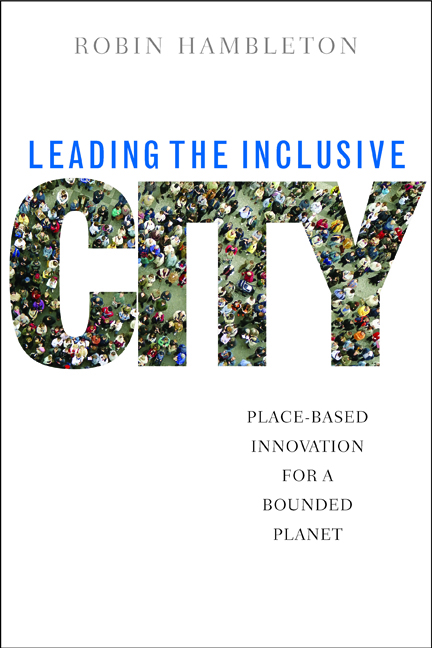Book contents
- Frontmatter
- Dedication
- Contents
- List of figures
- List of innovation stories
- About the author
- Preface
- A guide to the book
- Overview
- Part 1 Diagnosis: Understanding trends and challenges
- Part 2 Concepts: Place, leadership, innovation and democratic governance
- Part 3 Experiences: Place-based leadership in action
- Part 4 Lesson drawing: Insights and international learning
- Notes
- Appendix: International city networks and resources
- Acknowledgements
- References
- Index
Eleven - From smart cities to wise cities
Published online by Cambridge University Press: 08 March 2022
- Frontmatter
- Dedication
- Contents
- List of figures
- List of innovation stories
- About the author
- Preface
- A guide to the book
- Overview
- Part 1 Diagnosis: Understanding trends and challenges
- Part 2 Concepts: Place, leadership, innovation and democratic governance
- Part 3 Experiences: Place-based leadership in action
- Part 4 Lesson drawing: Insights and international learning
- Notes
- Appendix: International city networks and resources
- Acknowledgements
- References
- Index
Summary
What we urgently need today is a more inclusive view of what it means to be
a scholar – a recognition that knowledge is acquired through research, through
synthesis, through practice, and through teaching
Ernest L. Boyer, Scholarship Reconsidered, 1990Introduction
Digital enthusiasts argue that smart cities are a panacea. They claim that the current revolution in communication technologies will transform cities in the 21st Century in the way that electricity changed them in the last. For sceptics these claims are frothy hype. Many will argue that somewhere in between these extremes there is an emerging consensus. This consensus claims that advances in information and communication technologies (ICT) are ushering in a new era in which pervasive electronic connections are making cities more liveable and more democratic. In this chapter I want to question this consensus. I do this not to be contrary for the sake of it, but because the evidence that smartness is building more inclusive cities is fragile.
I am not here arguing against the imaginative use ICT in modern city management. Indeed, I have already shown that new technology, when deployed by well-trained and talented staff, can boost the quality of public services. Innovation Story 3 in Chapter 6 provides a good practical example to support my argument. It illustrates how new technology can be used not only to enhance access to services, but also to bring about significant improvements in the internal management of City Hall departments. In this case we can see how the Chicago 311 and Open311 service provides an astonishing level of service responsiveness to citizens. As in many other US cities, any resident can dial 311 at any time and receive immediate assistance. This level of responsiveness would be impossible in the absence of ICT to provide up to the minute information to front line staff, and to route requests electronically to the relevant departments.
However, having super-responsive services is not enough to create an inclusive city. Smart technology, including recent advances in social media, can enhance the performance of public services, but a troubling question remains: Are these technologies strengthening local democracy and giving voice to the have-nots in society?
- Type
- Chapter
- Information
- Leading the Inclusive CityPlace-Based Innovation for a Bounded Planet, pp. 283 - 308Publisher: Bristol University PressPrint publication year: 2014



